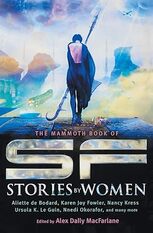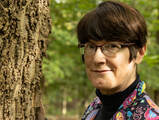| This is one of those rare anthologies where all of the stories are well-written and most pack a punch that lingers long after reading. Out of the thirty-three selections in The Mammoth Book of SF Stories by Women, almost all are tales I’ll reread both for the pure pleasure of the stories and to study them as a writer. The editor, Alex Dally MacFarlane, has arranged these gems in a way that creates an overall reading arc that is highly enjoyable. They range from silly to sublime. Some are narrated as letters or anthropology studies, others have a more traditional story structure. An excellent anthology all around. |
- “Excerpt From a Letter by a Socialist-Realist Aswang,” by Kristin Mandigma is a hilarious rant from a Filipino ghoul. He takes his “Comrade” to task for writing a story about “an interstellar war between monster cockroaches and alienated capitalist soldiers.” Note: My space-cockroach story was accepted for publication before I read this!
- Lucy Sussex uses a layered story structure, weaving back and forth in time and between a jail-cell interview and court testimony to unveil “The Queen of Erewhon,” a haunting tale of forbidden love amidst rigid social traditions. “Valentines” by Shira Lipkin uses a similar layered structure, but creates a very different story in both tone and emotional intimacy. The ending reveal is both terrifying and poignant.
- “The Other Graces” by Alice Sola Kim turns the time-travel/multiverse trope on its ear. Grace is an Ivy League hopeful who comes from a poor, “yellow-trash” Korean family. The tension ratchets up when her mentally-ill father takes the college envelope she’s been waiting for, thinking he’s saving her from his own demons. Most of the story is narrated in second-person from a “future” Grace.
- “Eleven Holy Numbers of the Mechanical Soul” by Natalia Theodoridou is about the last survivor of a spaceship crash on an ocean world. The main character, Theo, has constructed mechanical beasts to keep himself company. Theo’s plight and the indifferent nature of the beasts creates a compelling crisis after a storm strikes.
- Ursula K. LeGuin is one of my favorite authors. “Mountain Ways” is written as an anthropology study of a culture that forms foursome marriages. Conflict is inevitable when two lovers from a small village try to game the system. The surprising ending, both heartwarming and insightful, expertly balanced the human need for connection and autonomy.
- “Astrophilia” by Carrie Vaughn is set in a post-apocalyptic world where cooperation is key to survival. A young weaver, Stella, becomes part of a new household, but discovers underlying tension between the house leader and a young woman her age who yearns to revive the lost art of astronomy. Stella must choose between obedience and doing what she believes is right. I loved the world of this story: full of human conflict but with an overall bias toward hope and love.
- Nancy Kress presents an ethical dilemma in “Ej-Es,” a story of an interstellar rescue mission that finds most of a colony dead and the survivors severely compromised mentally. The main character is a biologist on her final mission before retirement who disagrees with the majority opinion of noninterference. But what if “do no harm” causes unbearable suffering? The ending is heartbreaking.
- “Immersion” by Aliette de Bodard is another impactful tale. This is a world where people wear avatars to make them look more attractive, but people can become overly dependent on avatars out of social insecurity and lose themselves. The author played with cultural stereotypes and colonialism through a prism of strong emotions. The story blossomed from different points of view to create a powerful and hopeful ending.
- Karin Tidbeck explores cultural diversity and disability in “Sing.” The story is told from the perspective of the village tailor and her relationship to an offworlder who thinks he’s found a place to retire from the fast-paced life he’s lived. He is frustrated by his inability to sing like the natives and ignores warnings to be satisfied with his “mute” status. The bittersweet ending is ultimately hopeful.
- “The Second Card of the Major Arcana” by Thoraiya Dyer is another tour de force. We follow a newly awakened being leaving a trail of death whose identity is not immediately clear but is revealed as the story unfolds. The ending was a delightful surprise and thoroughly satisfying.


 RSS Feed
RSS Feed